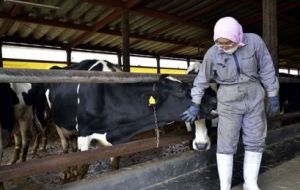MercoPress. South Atlantic News Agency
Beef scare in Japan: caesium contaminated meats reached consumers
 Fukushima is mainly a rural province with at least 4.000 cattle farms
Fukushima is mainly a rural province with at least 4.000 cattle farms Japan has imposed a ban on all beef coming from the prefecture of Fukushima, where three nuclear reactors melted down following the March 11 magnitude 9.0 earthquake and tsunami. The Japanese government is also apologizing for its delayed response to radioactive meat reaching the market.
The ban was imposed a week after meat with excessive levels of radioactive caesium was distributed to stores across much of Japan, 38 of 47 provinces. Chief Cabinet Secretary Yukio Edano said officials are still attempting to ascertain the extent of the sale of the contaminated meat. Fukushima province has at least 4.000 major cattle farms.
Edano says that some beef cattle outside Fukushima prefecture were also fed rice straw with high levels of radioactive caesium. He says the government is working with surrounding communities and the Agriculture Ministry to track all the meat distributed under those conditions.
This is the latest embarrassing incident for the government of Prime Minister Naoto Kan which has struggled to cope with one of Japan's worst-ever disasters. More than 20,000 people died or disappeared in the March 11 earthquake and tsunami.
The major quake and tsunami also severely damaged the Fukushima-1 nuclear power plant where reactors suffered meltdowns. That prompted evacuations of numerous villages in Fukushima prefecture, a primarily agricultural area, where crops were irradiated.
PM Kan apologized on Tuesday for the beef incident and said he is extremely sorry he was not able to prevent it from happening. Top government spokesman Edano acknowledges Japan did not act quickly enough after the first cases of contaminated beef were reported.
Edano says the government did not fully inform the public and cattle farmers, causing them deep anxiety. He added that cattle farmers will be compensated for their losses as a result of the ban, and so will retailers since the price of beef is expected to drop.
Authorities so far have been able to determine that 648 cows ate contaminated rice straw. Officials said the feed consumed by the animals measured up to 500 times the national safety limit for radioactive caesium.
Nevertheless Japan's health ministry insists that the radioactive meat that was consumed by people does not pose a major risk.




Top Comments
Disclaimer & comment rules-

Read all commentsThis was my biggest fear - that Cs 137 would enter the human food chain.
Jul 20th, 2011 - 02:53 pm 0Depending on the levels, fluctuations and ranges in key food resources this could be innocuous or very, very serious.
I remember tracking the contamination geography of Cs 137 levels in UK meat-to-market, and 'rejected' meat-on-the-hoof, for over four years after Chernobyl. The residues are still there in the soils, though increasingly bound up in soil chemistrys.
Japan has a long-term problem now.
Commenting for this story is now closed.
If you have a Facebook account, become a fan and comment on our Facebook Page!